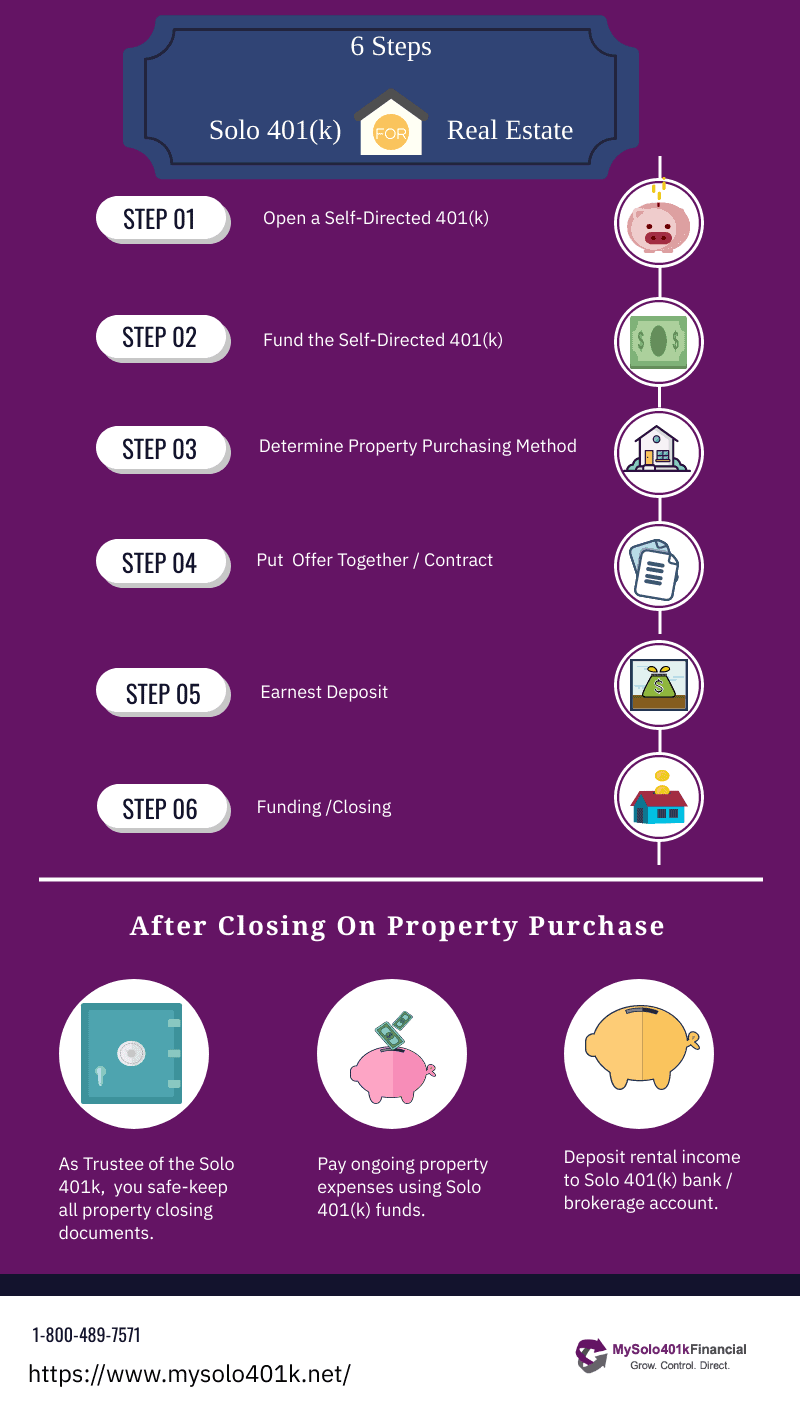You can invest in real estate using your 401K by rolling it into a self-directed IRA. This allows for greater investment flexibility.

How to Use Your 401K to Invest in Real Estate? Investing in real estate through a 401K can diversify your retirement portfolio. A self-directed IRA provides the opportunity to invest in various types of real estate, such as rental properties, commercial buildings, and undeveloped land. This strategy can potentially yield higher returns compared to traditional stocks and bonds.
It’s essential to understand the rules and regulations governing self-directed IRAs to avoid penalties. Consult with a financial advisor to navigate the complexities and make informed decisions. With careful planning, your 401K can become a powerful tool for real estate investments, enhancing your financial future.

Credit: www.sensefinancial.com
Introduction: How to Use Your 401K to Invest in Real Estate
Investing in real estate using your 401K can be a smart move. It allows you to diversify your investment portfolio. But first, let’s understand what a 401K is and why real estate is beneficial.
What Is A 401k?
A 401K is a retirement savings plan offered by employers. It allows employees to save and invest a portion of their paycheck. These contributions are often matched by the employer. The money grows tax-deferred until withdrawal.
There are two main types of 401K plans:
- Traditional 401K: Contributions are made with pre-tax dollars.
- Roth 401K: Contributions are made with after-tax dollars.
Both plans have unique benefits and tax implications. Understanding these can help you maximize your investment.
Benefits Of Real Estate Investment
Investing in real estate offers many advantages:
| Benefit | Description |
|---|---|
| Passive Income | Real estate generates rental income, providing a steady cash flow. |
| Appreciation | Property values tend to increase over time, boosting your wealth. |
| Diversification | Real estate diversifies your portfolio, reducing risk. |
| Tax Benefits | There are tax deductions for mortgage interest and property taxes. |
These benefits make real estate a powerful investment tool. Combining it with your 401K can enhance your financial security.
Self-directed 401k Basics
Investing your 401K in real estate can be a smart move. A Self-Directed 401K allows you to take control of your retirement savings. Understanding the basics is the first step. Let’s dive into what a Self-Directed 401K is and how to set one up.
What Is A Self-directed 401k?
A Self-Directed 401K is a retirement account. It gives you more investment choices. You can invest in real estate, gold, or private companies. It’s different from a regular 401K. In a regular 401K, you can only invest in stocks, bonds, or mutual funds.
With a Self-Directed 401K, you are the boss. You decide where to invest. This can lead to better returns. But you need to be careful. Real estate investing has risks.
Setting Up A Self-directed 401k
To set up a Self-Directed 401K, follow these steps:
- Find a custodian who offers Self-Directed 401K plans.
- Open a new Self-Directed 401K account.
- Roll over your existing 401K funds into the new account.
Here is a simple table showing the steps:
| Step | Description |
|---|---|
| 1 | Find a custodian |
| 2 | Open a new account |
| 3 | Roll over funds |
Once your account is set up, you can start investing in real estate. You can buy rental properties or invest in real estate funds. Always do your research before investing. Make sure you understand the market. A good investment can grow your retirement savings.
Eligible Real Estate Investments
Investing your 401K in real estate can be a smart move. Understanding eligible real estate investments is crucial. These investments can vary, offering multiple ways to grow your retirement funds.
Types Of Real Estate
Various types of real estate qualify for 401K investment. Here are some common options:
- Residential Properties – Homes, apartments, and condos.
- Commercial Properties – Office buildings, retail spaces, and warehouses.
- Industrial Properties – Factories, storage units, and distribution centers.
- Land – Vacant land, farmland, and development plots.
Investment Properties Vs. Personal Use
It’s important to differentiate between investment properties and personal use. Your 401K can be used for investment properties but not for personal use.
| Criteria | Investment Properties | Personal Use |
|---|---|---|
| Purpose | Generate income or appreciation | Personal residence or vacation home |
| 401K Eligibility | Eligible | Not eligible |
| Examples | Rental homes, commercial spaces | Primary home, holiday cabin |
Investment properties can generate rental income. They may also appreciate in value. This makes them suitable for 401K investments. Personal use properties cannot be purchased using 401K funds. These include your main home or a vacation house.
Rules And Regulations
Investing your 401K in real estate can be a smart move. Understanding the rules and regulations is crucial. This ensures your investment complies with the law.
Irs Guidelines
The IRS has clear rules for using a 401K to invest in real estate. It’s important to follow these guidelines to avoid penalties.
- Real estate must be for investment purposes only.
- You cannot live in or use the property personally.
- All transactions must be at arm’s length.
These rules help maintain the tax-advantaged status of your 401K.
Prohibited Transactions
Engaging in prohibited transactions can lead to serious consequences. The IRS defines specific activities that you must avoid.
| Prohibited Transactions | Examples |
|---|---|
| Self-dealing | Buying property for your personal use |
| Indirect benefits | Renting to family members |
| Using disqualified persons | Hiring close family for maintenance |
Violating these rules can result in significant penalties. Always consult a tax professional before proceeding.
Funding Your Real Estate Investment
Investing in real estate can be a smart way to grow your wealth. One powerful method is using your 401K. This section will guide you on funding your real estate investment.
How to Use Your 401K to Invest in Real Estate: Using 401k Funds
Your 401K can be a great source of funds. Here are steps to use your 401K for real estate:
- Check your 401K plan rules.
- Set up a self-directed IRA.
- Transfer funds to the self-directed IRA.
- Find a suitable real estate investment.
- Use the self-directed IRA for the purchase.
Self-directed IRAs allow more investment options. This includes real estate, startups, and more. Make sure to follow IRS rules. This avoids penalties and taxes.
Avoid using a loan from your 401K. Loans must be repaid within five years. Missing payments can lead to penalties.
Alternative Funding Options
There are other ways to fund your real estate investment. These include:
- Personal savings
- Investment property loans
- Hard money loans
- Partnerships
Personal savings are straightforward but may take time to build. Investment property loans offer good rates but require a strong credit score. Hard money loans are quick but have high interest rates. Partnerships can spread the risk and rewards.
Consider each option carefully. Choose the one that fits your financial situation best.
| Funding Option | Pros | Cons |
|---|---|---|
| Personal Savings | No debt, full control | Time-consuming to save enough |
| Investment Property Loans | Good rates, leverage | Requires strong credit, adds debt |
| Hard Money Loans | Quick access, less paperwork | High interest, short terms |
| Partnerships | Shared risk, combined resources | Shared profits, potential conflicts |
Understanding these options helps you make an informed decision. Each method has its own benefits and risks. Choose wisely to maximize your real estate investment success.
Risks And Considerations
Using your 401K to invest in real estate can be lucrative. But it comes with risks and considerations. Understanding these risks helps you make informed decisions.
Market Fluctuations
Real estate markets can change quickly. Property values can rise or fall. Economic conditions can influence these changes. A downturn can reduce your property’s value. This can impact your investment returns. Always research market trends before investing.
Liquidity Concerns
Real estate investments are not easily liquidated. Selling property takes time. You can’t quickly convert it to cash. This can be a problem in emergencies. Ensure you have other liquid assets. Always have a backup plan for liquidity.
Additional Considerations
Using your 401K for real estate can incur fees. Loans from your 401K must be repaid. Otherwise, you face penalties. You may also lose potential stock market gains. Weigh these factors carefully before deciding.
Tax Implications
Investing your 401K in real estate involves understanding the tax implications. It’s important to know how taxes will affect your investments. Here, we’ll explore key tax aspects you need to consider.
Tax-deferred Growth
One key benefit of using a 401K for real estate is tax-deferred growth. This means your investment gains are not taxed until you withdraw funds. This can potentially grow your investment faster compared to taxable accounts.
Penalties And Withdrawals
Early withdrawal from a 401K can result in penalties. The IRS imposes a 10% penalty for withdrawals before age 59½. You also need to pay income tax on the withdrawn amount.
Consider using a self-directed IRA to avoid penalties. This allows you to invest in real estate without early withdrawal penalties. You can roll over your 401K into a self-directed IRA.
| Scenario | Penalty | Tax |
|---|---|---|
| Early Withdrawal | 10% Penalty | Income Tax |
| Self-Directed IRA | No Penalty | Deferred Tax |
- Early withdrawal may incur a 10% penalty.
- Using a self-directed IRA can help avoid penalties.
- Tax on investment gains is deferred until withdrawal.
By understanding these tax implications, you can make informed decisions. This ensures your real estate investment strategy is efficient and tax-smart.
How to Use Your 401K to Invest in Real Estate: Tips For Success
Investing your 401K in real estate can be a smart move. But, you need to know the tips for success. These tips will help you make informed decisions and avoid pitfalls.
Diversification Strategies
Diversify your investments to spread the risk. Don’t put all your 401K funds in one property. Consider different types of real estate:
- Residential properties
- Commercial properties
- Real Estate Investment Trusts (REITs)
Use a mix of these options to balance your portfolio. This way, if one investment fails, others can still succeed.
Working With Professionals
Get help from real estate professionals. They can guide you through complex transactions. Consider working with:
- Real estate agents
- Financial advisors
- Property managers
A financial advisor can help you understand tax implications. A real estate agent can find good properties. A property manager can handle day-to-day tasks.
| Professional | Role |
|---|---|
| Real Estate Agent | Finds properties |
| Financial Advisor | Gives tax advice |
| Property Manager | Manages properties |
Investing in real estate with your 401K can be rewarding. Follow these tips for success to make the most of your investment.
Case Studies

Credit: www.mysolo401k.net
Investing your 401K in real estate can be a great decision. Real-life examples show successful investments and key lessons. Let’s dive into some inspiring stories.
Successful Investments
| Investor | Investment Type | Initial 401K Amount | Return on Investment |
|---|---|---|---|
| John Doe | Rental Property | $150,000 | $300,000 |
| Jane Smith | Commercial Real Estate | $200,000 | $450,000 |
John Doe used his 401K to buy a rental property. His investment doubled in value. Jane Smith invested in commercial real estate. She more than doubled her initial investment.
Lessons Learned
- Research the Market: Understand local real estate trends.
- Consult Experts: Speak with financial advisors and real estate agents.
- Diversify Investments: Don’t put all funds into one property.
- Understand Risks: Real estate can be volatile.
Research the market before investing. Understand the local trends. Consult experts for advice. Financial advisors and real estate agents can help. Diversify investments to spread risk. Finally, understand risks because real estate can be volatile.

Credit: www.forbes.com
Conclusion
How to Use Your 401K to Invest in Real Estate? Investing your 401K in real estate can diversify your portfolio. It offers potential growth and stable income. Follow the steps outlined to make informed decisions. Always consult a financial advisor before proceeding. Real estate investing can be a valuable part of your retirement strategy.
Start exploring the possibilities today.
FAQs For How to Use Your 401K to Invest in Real Estate
Can I Take Money Out Of My 401k To Invest In Real Estate?
Yes, you can take money out of your 401k to invest in real estate. Be aware of penalties and taxes.
How To Convert 401k To Real Estate Without Penalty?
Roll over your 401k to a self-directed IRA. Use the IRA funds to invest in real estate without penalties. Consult a financial advisor.
Can I Borrow From My 401k To Buy Real Estate?
Yes, you can borrow from your 401k to buy real estate. You can take a loan up to $50,000. Repay within five years to avoid penalties.
Can A 401(k) Own Real Estate?
Yes, a 401(k) can own real estate through a self-directed 401(k). This allows investment in various properties.






